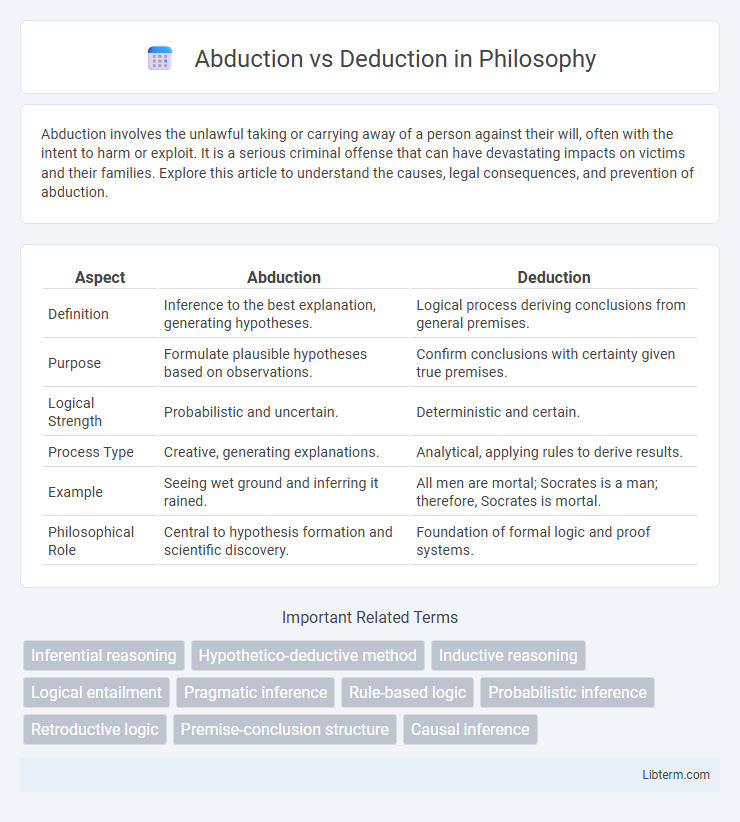Abduction involves the unlawful taking or carrying away of a person against their will, often with the intent to harm or exploit. It is a serious criminal offense that can have devastating impacts on victims and their families. Explore this article to understand the causes, legal consequences, and prevention of abduction.
Table of Comparison
| Aspect | Abduction | Deduction |
|---|---|---|
| Definition | Inference to the best explanation, generating hypotheses. | Logical process deriving conclusions from general premises. |
| Purpose | Formulate plausible hypotheses based on observations. | Confirm conclusions with certainty given true premises. |
| Logical Strength | Probabilistic and uncertain. | Deterministic and certain. |
| Process Type | Creative, generating explanations. | Analytical, applying rules to derive results. |
| Example | Seeing wet ground and inferring it rained. | All men are mortal; Socrates is a man; therefore, Socrates is mortal. |
| Philosophical Role | Central to hypothesis formation and scientific discovery. | Foundation of formal logic and proof systems. |
Introduction to Abduction and Deduction
Abduction is a form of logical inference that generates the most plausible explanation for a set of observations, often used in hypothesis formation and diagnostic reasoning. Deduction involves deriving specific conclusions from general premises with guaranteed logical certainty, typically applied in formal proofs and mathematical reasoning. Both methods are fundamental in problem-solving but differ in their approach to reasoning and certainty of outcomes.
Defining Abductive Reasoning
Abductive reasoning is the process of forming the most plausible explanation from incomplete or uncertain information, often described as inference to the best explanation. Unlike deduction, which guarantees conclusions based on premises, abduction generates hypotheses that best account for observed evidence. It plays a critical role in scientific discovery, medical diagnosis, and everyday problem-solving by guiding decision-making under uncertainty.
Understanding Deductive Reasoning
Deductive reasoning involves drawing logically certain conclusions from general premises, ensuring that if the premises are true, the conclusion must be true. It plays a critical role in formal logic, mathematics, and scientific proofs by providing a structured framework for validating hypotheses. Understanding deductive reasoning enhances problem-solving skills and supports rigorous analytical thinking in diverse academic and practical contexts.
Key Differences between Abduction and Deduction
Abduction involves forming the most likely explanation based on incomplete or uncertain information, while deduction derives logically certain conclusions from given premises. Deduction guarantees truth if the premises are true, whereas abduction suggests plausible hypotheses without certainty. The key difference lies in deduction's definitive reasoning process versus abduction's inferential guesswork to explain observations.
Historical Origins of Abduction and Deduction
Abduction, introduced by Charles Sanders Peirce in the late 19th century, originated as a form of logical inference aimed at generating hypotheses to explain observations, contrasting with deduction's roots in ancient Greek philosophy, particularly Aristotle, who formalized it as a method of deriving conclusions from general premises. Deduction has been foundational in classical logic and scientific reasoning, employing a top-down approach to verify truths based on established axioms. The historical development of abduction emphasized creative hypothesis formation, positioning it as a complementary process to the rigorous validation characteristic of deduction.
Applications of Abductive Reasoning
Abductive reasoning is widely applied in medical diagnostics, where doctors infer the most likely disease based on symptoms. In artificial intelligence, it supports hypothesis generation in machine learning models for pattern recognition and fault detection. Legal investigations also utilize abductive logic to construct plausible explanations from limited evidence.
Uses of Deductive Reasoning
Deductive reasoning is extensively used in mathematics and formal logic to derive specific conclusions from general premises with certainty. It plays a crucial role in scientific experiments by validating hypotheses through structured testing and observation. Legal analysis often relies on deductive reasoning to apply established laws to particular cases, ensuring consistent and precise outcomes.
Advantages and Limitations of Each Method
Abduction excels in generating plausible hypotheses from incomplete data, making it valuable in fields like medical diagnosis and forensic analysis, but it may lead to less certain conclusions due to its reliance on best guesses. Deduction ensures logically valid conclusions when premises are true, providing certainty in mathematical proofs and formal logic, yet it struggles with unknowns and cannot generate new information beyond the given premises. Both methods complement each other by balancing hypothesis generation with logical validation, though their effectiveness depends on the context and nature of the problem.
Abduction vs Deduction in Scientific Research
Abduction in scientific research involves formulating the most plausible hypothesis based on limited observations, enabling researchers to generate new theories and explanations. Deduction systematically tests these hypotheses through logical reasoning and experiments to confirm or refute predictions derived from established premises. The interplay between abduction and deduction drives the scientific method, combining creative hypothesis generation with rigorous empirical validation.
Choosing Between Abduction and Deduction: Practical Guidelines
Choosing between abduction and deduction depends on the problem context and data availability. Deduction is optimal for deriving logically certain conclusions from established premises, while abduction excels at generating plausible hypotheses from incomplete or ambiguous information. Practical guidelines suggest employing deduction in well-defined scenarios with clear rules and leveraging abduction in exploratory phases or when dealing with novel or uncertain phenomena.
Abduction Infographic

 libterm.com
libterm.com